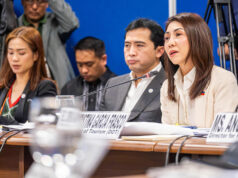By Vann Marlo M. Villegas, Reporter
A MANILA court deferred the arraignment for cyber-libel of online news site Rappler, Inc., its CEO Maria A. Ressa, and former researcher Reynaldo Santos, Jr. while their motion to dismiss the case is still pending.
In an order, Judge Rainelda H. Estacio-Montesa of Manila Regional Trial Court (RTC) Branch 46 reset the arraignment to April 12.
Ms. Estacio-Montesa gave the prosecution 10 days to comment on Rappler’s Feb. 26 motion to quash, and the accused five days from the receipt of the comment to file their reply. The prosecution is then given five days to file its rejoinder.
The case stemmed from the Department of Justice’s (DoJ) indictment of Rappler, Ms. Ressa and Mr. Santos last Jan. 10 over a May 29, 2012, article titled, “CJ Using SUVs of Controversial Businessman,” which reported that businessman Wilfredo D. Keng, the alleged owner of the vehicle used by then chief justice Renato C. Corona, is involved in various illegal activities.
Mr. Keng said he requested Rappler to take down the article but was turned down. The article was further updated on Feb. 19, 2014. He filed a complaint before the National Bureau of Investigation (NBI) in October 2017.
Ms. Ressa was arrested by the NBI on Feb. 13 by virtue of the arrest warrant issued by RTC Branch 46, and posted bail on Feb. 14. Mr. Santos is also out on bail as of Feb. 15.
In the motion to quash, the accused, represented by legal counsel from the Free Legal Assistance Group, claimed the prosecution misapplied the “multiple republication” principle in indicting Rappler for cyber-libel as the Supreme Court (SC) decision cited as its basis “is not applicable nor does it constitute authority.”
“It is a Third Division decision that only binds the parties thereto. It is canonical that only decisions of the Supreme Court En Banc are vested with the authoritativeness or precedential character,” they said in the motion, adding that it only applies to print media.
The accused claimed that the Cyber Crime Protection Act of 2012 was applied retroactively on the updated article on Feb. 19, 2014 as the SC imposed a temporary restraining order on the law from Oct. 9, 2012 to April 22, 2014.
They also said the “offense has been extinguished,” maintaining that the prescriptive period for cyber libel is one year because it is the same offense as libel in the Revised Penal Code with a prescriptive period of one year “committed through new and additional means.”



